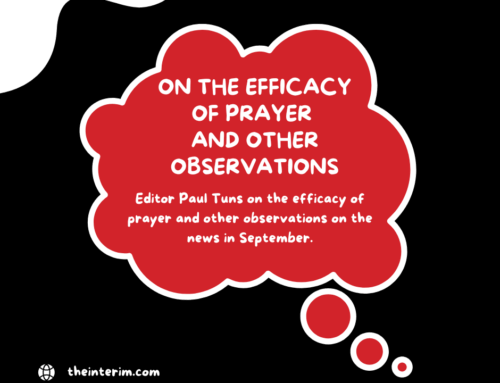It appears that the Canadian Hospice Palliative Care Association has decided to move from a position of opposing euthanasia and assisted suicide to a position of temporary neurality. This creates great concern for both opponents of euthanasia and advocates for people with disabilities in relation to the end-of-life care for the most vulnerable members of society.
In 2005, the British Medical Association changed its position on assisted suicide to that of a neutral position. The reaction of mainstream physicians in the U.K. was to demand that the position be reviewed at their annual convention in 2006, where they voted to resume a position of opposition to assisted suicide.
At their Nov. 22, 2006 meeting, the CHPCA indicated that their board of directors approved their statement of physician-assisted dying. The CHPCA has asked for further consultation from their membership over the next two years concerning their policy on physician-assisted dying. In the meantime, they have established a set of guidelines in relation to these issues.
The document’s guidelines have been worded in a neutral manner. There is no way to indicate whether the CHPCA supports or opposes euthanasia and assisted suicide. The CHPCA does recognize that euthanasia and assisted suicide are currently illegal. They also recognize that healthcare providers should have the right not to participate in such acts.
The title of their policy alert, Physician-Assisted Dying (PAD) Issues Document, represents a change in language. At the World Federation of Right to Die Societies international conference held in Toronto last September, there was a commitment by the right-to-die activists to change the language of the euthanasia debate to enable their message to appeal to more people. The use of the term “physician-assisted dying” is the preferred language of the right-to-die lobby.
The CHPCA also stated in its draft statement: “However, despite access to high quality end-of-life care, a small number of Canadians may still choose to have control over their own death. As hospice palliative care practitioners, we will respect their right to choose and will not abandon them.”
When analyzing the reasons why a small number of Canadians may still choose to have “control over their own death,” one must acknowledge that if it their “right to choose” is accepted, we are in fact abandoning them. We are abandoning them to their fears, to their depression, to their family pressures and to their existential questioning, rather than affirming them as a valued members of society. This statement is a direct threat to the most vulnerable members of our society, who, due to societal attitudes, will often question the value and dignity of their own lives.
The EPC is concerned with the inconsistency of the CHPCA position in relation to their recommendations. They state: “Before considering legalizing euthanasia and physician-assisted suicide, Canada has a responsibility to ensure that comprehensive, compassionate hospice palliative care is available to all and that Canadians are aware of these services and how to access them.”
Considering the lack of access to hospice palliative care that many Canadians face, and considering the lack of awareness of existing services and options for end-of-life care, the previous statement should be enough for the CHPCA to renew its opposition to legalizing euthanasia and assisted suicide, at least until the time when all Canadians have access to comprehensive, compassionate hospice palliative care.
It is the hope of the EPC that hospice palliative care professionals will demand a quick and open debate on this policy and resolve to reinstate their opposition to euthanasia and assisted suicide.
Alex Schadenberg is executive director of the Euthanasia Prevention Coalition.




